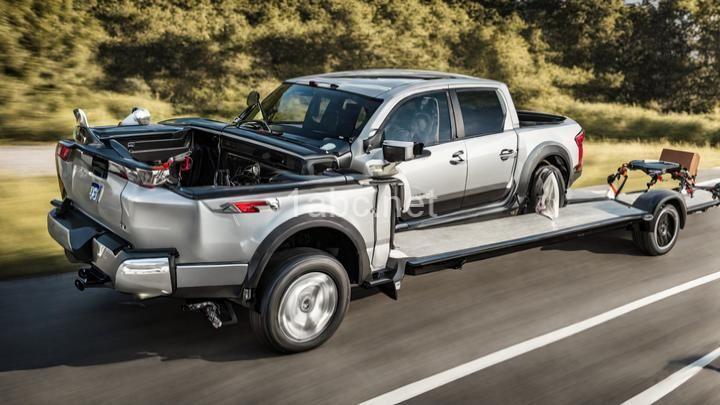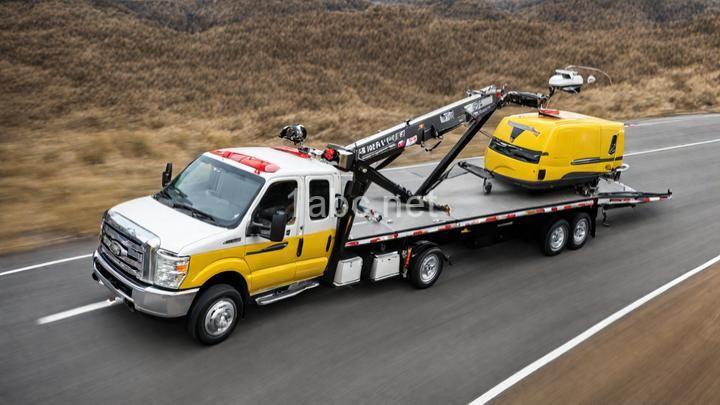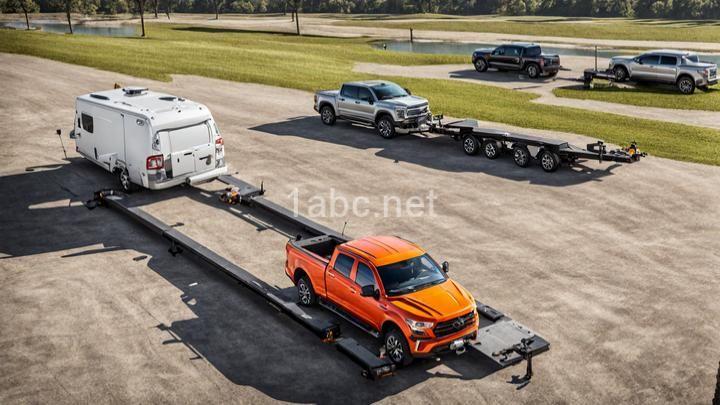The Benefits of Using Electric or Hybrid Vehicles for Towing

Introduction:
Are you considering towing with an electric or hybrid vehicle? If so, you're in for a treat! In this article, we'll explore the advantages of using electric or hybrid vehicles for towing. From environmental friendliness to fuel efficiency and powerful torque, these vehicles offer a range of benefits that make them a great choice for towing needs. So, grab your popcorn and let's dive into the world of electric and hybrid towing!
Section 1: Environmental Friendliness
When it comes to being environmentally friendly, electric and hybrid vehicles take the lead. These vehicles produce significantly fewer greenhouse gas emissions compared to traditional gasoline-powered vehicles. By opting for an electric or hybrid vehicle for towing, you're making a conscious choice to reduce your carbon footprint and contribute to improved air quality. It's a win-win situation for both you and the environment!
Section 2: Fuel Efficiency
One of the standout benefits of electric and hybrid vehicles is their exceptional fuel efficiency. Towing heavy loads can be a fuel-consuming task, but with electric or hybrid vehicles, you'll be able to save money on fuel costs. These vehicles utilize advanced technologies such as regenerative braking, which converts kinetic energy into usable electricity, maximizing energy usage. So, not only will you be saving on fuel costs, but you'll also be doing your part to conserve energy.
Section 3: Powerful Torque
Electric motors in electric and hybrid vehicles provide impressive torque, which translates into better towing capabilities. Torque is the force that rotates an object around an axis, and electric motors excel in delivering instant torque. This means that when you need to tow a heavy load, electric or hybrid vehicles will provide the power you need to do so effortlessly. No more struggling or worrying about whether your vehicle can handle the task at hand!
Section 4: Quiet Operation
One of the often-overlooked benefits of electric or hybrid vehicles for towing is their quiet operation. Unlike traditional tow trucks that can be noisy and disruptive, electric and hybrid vehicles operate silently. This not only enhances comfort for drivers and passengers during long journeys but also reduces noise pollution in residential areas. Imagine towing a load without the constant rumble of an engine – it's a peaceful and enjoyable experience!
Section 5: Low Maintenance Needs
When it comes to maintenance, electric and hybrid vehicles have the upper hand. These vehicles have fewer moving parts compared to traditional gasoline-powered vehicles, reducing the chances of mechanical failure. Additionally, electric and hybrid vehicles do not require oil changes, saving you time and money. Another benefit is that regenerative braking, which is commonly used in electric and hybrid vehicles, puts less strain on the brakes, resulting in minimal brake wear. So, not only will you be towing efficiently, but you'll also have fewer maintenance needs to worry about.
Conclusion:
In conclusion, there are numerous advantages to using electric or hybrid vehicles for towing. From their environmental friendliness and fuel efficiency to their powerful torque and quiet operation, these vehicles offer a range of benefits that make them a fantastic choice for towing needs. By making the switch to electric or hybrid vehicles, not only will you be reducing your carbon footprint and saving on fuel costs, but you'll also enjoy a smoother and quieter towing experience. So, why not give it a try?
We'd love to hear from you! Have you ever towed with an electric or hybrid vehicle? Share your experiences or thoughts in the comments section below. Let's continue the conversation and inspire others to make eco-friendly choices for their towing needs.
FREQUENTLY ASKED QUESTIONS
Can electric or hybrid vehicles be used for towing?
Yes, electric and hybrid vehicles can be used for towing, but there are a few factors to consider. Firstly, it's important to check the towing capacity of the specific electric or hybrid vehicle you are interested in. Electric and hybrid vehicles generally have lower towing capacities compared to traditional gasoline or diesel-powered vehicles. This is due to the added weight of the batteries and other components, which can limit their ability to tow heavy loads.
Additionally, the range of an electric or hybrid vehicle may be affected when towing. Towing puts additional strain on the vehicle's battery, which can result in a shorter driving range. It's important to consider the distance you'll be towing and whether the vehicle's range will be sufficient for your needs.
Furthermore, towing with an electric or hybrid vehicle may require additional equipment. Some electric and hybrid vehicles may require the installation of a towing package, which includes features such as a hitch receiver and trailer wiring harness. It's essential to consult the vehicle's manufacturer or a professional to ensure that all necessary equipment is properly installed and compatible with the vehicle.
Overall, while electric and hybrid vehicles can be used for towing, it's important to carefully consider the towing capacity, range limitations, and any additional equipment requirements before making a decision. Consulting with the vehicle manufacturer or a knowledgeable professional will help ensure a safe and suitable towing experience.
What is the towing capacity of electric or hybrid vehicles?
The towing capacity of electric or hybrid vehicles can vary depending on the specific make and model. In general, electric and hybrid vehicles have a lower towing capacity compared to traditional gasoline or diesel-powered vehicles. This is because the added weight of towing a trailer or other heavy load can greatly impact the overall efficiency and range of these vehicles.Most electric and hybrid vehicles are designed primarily for everyday commuting and are not intended to be heavy-duty towing vehicles. However, there are some electric and hybrid models that are capable of towing lighter loads, typically ranging from 1,000 to 3,500 pounds.
It's important to consult the manufacturer's specifications for the specific electric or hybrid vehicle you are interested in to determine its towing capacity. This information can usually be found in the vehicle's owner's manual or on the manufacturer's website.
It's worth noting that towing capacity can also be influenced by other factors such as battery capacity, motor power, and the presence of additional towing packages or upgrades. So, if towing is a priority for you, it's recommended to thoroughly research and compare different electric or hybrid vehicle options to find one that meets your towing needs.
Are there any limitations to towing with electric or hybrid vehicles?
There are a few limitations to towing with electric or hybrid vehicles that you should be aware of. First, the towing capacity of these vehicles is generally lower compared to traditional gasoline or diesel-powered vehicles. This means that they may not be able to tow heavy loads or large trailers.Additionally, towing can put a strain on the battery of an electric or hybrid vehicle, reducing its range. The increased weight and resistance from towing can deplete the battery faster, requiring more frequent charging or limiting the distance you can travel.
It's also important to consider the charging infrastructure when towing with an electric or hybrid vehicle. If you're planning a long trip, you'll need to make sure there are charging stations along your route to recharge the battery.
Lastly, towing with an electric or hybrid vehicle may affect the vehicle's stability and handling. The additional weight and size of the trailer can impact the vehicle's braking and maneuverability, so it's essential to exercise caution and be aware of the vehicle's limitations.
Overall, while electric and hybrid vehicles can tow, it's important to consider their towing capacity, range limitations, charging infrastructure, and potential impact on stability and handling. It's recommended to consult your vehicle's manual and follow the manufacturer's guidelines for safe towing practices.
What are the benefits of using electric or hybrid vehicles for towing?
Electric or hybrid vehicles offer several benefits when it comes to towing. Here are some advantages to consider:
-
Fuel Efficiency: Electric and hybrid vehicles are known for their superior fuel efficiency compared to traditional gasoline-powered vehicles. This translates to reduced fuel consumption while towing, helping you save money in the long run.
-
Environmental Friendliness: Electric and hybrid vehicles produce fewer emissions compared to conventional vehicles. By opting for an electric or hybrid vehicle for towing, you contribute to reducing air pollution and minimizing your carbon footprint.
-
Instant Torque: Electric motors provide instant torque, which is advantageous when towing heavy loads. This means you'll experience swift acceleration and better control over your vehicle, ensuring a smoother towing experience.
-
Regenerative Braking: Electric and hybrid vehicles utilize regenerative braking, which converts kinetic energy into electrical energy and stores it in the vehicle's battery. This feature helps recharge the battery while towing, extending your vehicle's range and reducing energy wastage.
-
Quiet Operation: Electric and hybrid vehicles operate quietly compared to their gasoline counterparts. This can be beneficial when towing, as it reduces noise pollution and provides a more peaceful driving experience.
-
Government Incentives: Many governments offer incentives and tax credits for purchasing electric or hybrid vehicles. These incentives can help offset the initial cost of buying such a vehicle, making it a more attractive option for towing enthusiasts.
It's important to note that the towing capacity of electric and hybrid vehicles may vary, so it's essential to check the manufacturer's specifications before towing. Additionally, charging infrastructure availability should be considered for longer trips. Nonetheless, electric and hybrid vehicles offer numerous benefits for those looking to tow while being environmentally conscious and saving on fuel costs.



